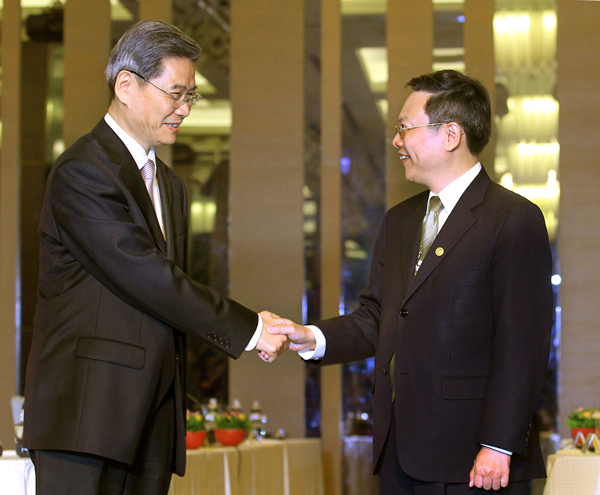Mainland's chief official on island affairs given a warm welcome
 |
|
Zhang Zhijun (left), the mainland's Taiwan affairs chief, and Wang Yu-chi, Taiwan's top official on mainland affairs, meet in Taoyuan, Taiwan, on Wednesday. It is the first time that a minister from the State Council's Taiwan Affairs Office has visited the island. Yao Zhiping / For China Daily |
The mainland's chief Taiwan affairs official began a four-day trip to the island on Wednesday by greeting people in the Minnan dialect, a major local language.
Zhang Zhijun, the first such official to visit the island since 1949, also said: "It took me only three hours to fly from Beijing to Taipei. However, it has taken 65 years for cross-Straits ties to take this step."
He was welcomed by crowds of local people chanting "people across the Straits are one family" and "the more we visit each other, the closer we are".
He said people from both sides have benefited from peaceful development in recent years.
Zhang said cross-Straits ties should be boosted continuously even though many challenges remain.
"In the past, it was unimaginable for chief officials on cross-Straits issues to meet with each other. I'm glad to become the first mainland director of Taiwan affairs to visit the island," he said. "My heart is sincere."
He made the remarks in the afternoon during a meeting with Wang Yu-chi, director of Taiwan's "Mainland Affairs Council". It is the second meeting between the two this year, following one held on the mainland in February.
Zhu Weidong, deputy director of the Institute of Taiwan Studies at the Chinese Academy of Social Sciences, said the historic visit symbolizes the establishment and normalization of a communication mechanism between the chief officials.
The mainland's cross-Straits policies will better reflect the opinions of Taiwan people after Zhang gets close to Taiwan society and hears what it has to say, Zhu said.
Zhang is scheduled to visit New Taipei City, Taichung and Kaohsiung, meet the mayors of the three cities and chat to experts, college students, farmers, fishermen, members of minority groups, religious figures, and businessmen and spouses from the mainland.
Chen Xiancai, a professor at Xiamen University's Taiwan Institute, said Zhang's visit is a key step for the mainland and Taiwan authorities to set up a system for holding direct talks on the basis of the "1992 Consensus" and the "one-China" principle.
It is also practical for Zhang to visit grassroots society in Taiwan, listen to people on low incomes and have direct talks with small and medium-sized enterprises, Chen added.
"Zhang is sincere in reaching out to the grassroots and getting to know the real thoughts of Taiwan people," he said.
Despite plans for a service trade pact triggering protests in Taiwan, the mainland has not abandoned efforts and continues to boost ties, reflecting its confidence in addressing the problems, Chen said.
The pact, aimed at giving investors wider access to each other's markets, triggered lengthy protests in Taiwan, but was not mentioned during the talks.
On March 18, hundreds of students stormed into the legislative chamber in Taipei to protest the pact. The protests ended in early April after the pact was sent to the legislature for further review.
Zhang said the two sides should boost political trust, maintain the "peaceful situation" of cross-Straits ties and enhance cooperation, adding that the grassroots and young people should communicate more to build mutual understanding.
Cross-Straits ties will inevitably encounter various problems and challenges, but these difficulties will be overcome if both sides make continuous efforts, he said.
Wang described Zhang's visit to Taiwan as director of the State Council Taiwan Affairs Office as having "great meaning".
By setting aside disputes and creating "win-win results", the two sides have seen remarkable achievements in improving cross-Straits ties in the past six years, he said.
Xinhua contributed to this story.
